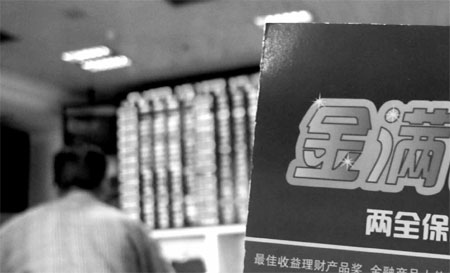Increased scrutiny as investors diversify

Compared with big State-owned banks, their medium-sized counterparts in China have a lower ability to pay their annualized returns although they are more aggressive in terms of selling wealth management products. [China Daily]
Liu Zhixiang, a sales manager with a Shanghai-based wealth management company, said he and his company are having a hard time since the fourth quarter of 2012.
"February and March are usually our peak time for sales but 2013 is going to give us a famine," said Liu.
The company's major business is to promote trust and private venture fund products to clients. Its traditional channel is to sell through banks but, because regulators require banks to scrutinize wealth management products, Liu's company is losing a critical channel for sales.
Many third-party wealth management institutions, such as Liu's company, relied on the same sales channels, banks, in the past. Some have signed headquarter-to-headquarter contracts and are authorized while the rest work on providing incentives - mostly commissions - to staff at branches or sub-branches of banks, making it difficult for regulators to monitor the products or sales revenues.
Regulators have strengthened supervision of the fast-growing wealth management sector since late 2012, when one wealth product sold through Hua Xia Bank failed to pay its annualized return.
Hua Xia Bank is not alone in banks involved in scandals about outlawed issuance and sales of wealth management products. Analysts warn that if such risks are not overcome banks will get into more trouble in the future.
"For bank staff, commissions given by some issuers of unauthorized WMPs are a huge lure. They can be as much as three times a month's salary," said a source with a Shanghai-based bank who was once contacted by a trust product salesman outside the bank.
"The headquarters of banks have difficulty getting direct knowledge about who and what is involved in such off-balance activities at sub-branch level so State regulators may find it even harder. To regulate the staff at low-level branches, the only thing you can rely on is self-discipline," the source said.
At a media event at the sidelines of the Credit Suisse Asian Investment Conference in Hong Kong, Tao Dong, chief regional economist, non-Japan Asia at Credit Suisse, said the trust sector has just exceeded the insurance sector as the second-largest financial sub-sector in China.
According to a report by Credit Suisse, the bank estimates that in China trust funds, WMPs and other components of the sector had grown to nearly 23 trillion yuan ($3.7 trillion) - 44 percent of the nation's GDP - by the end of 2012.
Assets under management by trust funds in particular marked record increases from 950 billion yuan in 2007 to 7.5 trillion yuan in 2012, the Credit Suisse report noted.
Hiddy He and Chunling Wen, analysts with Fitch Ratings, said in February the large off-balance-sheet activities and rapidly expanding transactions with non-banking institutions are risky.
Non-loan credit, by the end of 2012, comprised one-third of total credit outstanding in the financial sector, up from 15 percent in 2006, according to the rating agency's statistics.
Fitch Ratings reacted by downgrading the viability ratings of three banks one notch each - China CITIC Bank, Ping An Bank and Industrial Bank.
Compared with big State-owned banks, their medium-sized counterparts in China have a lower ability to pay their annualized returns although they are more aggressive in terms of selling WMPs, said a report by Fitch Ratings released on March 21.
The ratings agency said as banks stocks see slowing growth in yields, banks listed on exchanges will have greater capital pressure in 2013 and 2014.
In a circular released in March, the China Banking Regulatory Commission requested Chinese banks to separate their self-issued, asset pool-based WMPs from other products.
The commission's request, if implemented, would help improve transparency and reduce the liquidity and credit risks of the off-balance sheet products, according to a Barclays Research report.
Banks that are unable to meet the regulators' requirements by the end of April may face penalties and may be banned by the regulator from issuing more WMPs.
Barclays China economist Jian Chang said the government will strengthen regulatory oversight of such activities but will not tighten the sector dramatically. May Yan, Barclays China banks analyst, expects a limited impact because most of the large banks have already finished the process.
In Shanghai, regulators are pushing banks to scrutinize their staff and operational processes to rule out any possibility and scope for illegal sales of unauthorized WMPs.
A whistleblowers' telephone hotline was launched in Shanghai in February in an effort to clamp down on banking operations that breach regulations. The China Banking Regulatory Commission Shanghai Supervision Bureau said that as many as 74 banks as well as the city's Banking Association had signed up to the service.
Banks in Shanghai have been introducing increasing numbers of WMPs over the past year. They have attracted balances of around 7 trillion yuan, the commission said in a statement.
About 14 percent of China's wealth products were sold in Shanghai in 2012, but commission officials said cases of illicit operations, including selling unauthorized products, had been identified and that it was critical to strengthen effective management over financial institutions.
Investors said they need WMPs to hedge against the increasing consumer price index.
"The yield from wealth management products is higher than the deposit interest rate," said Wan Xiaodi, a 62-year-old retired teacher in Shanghai.
"I hope banks can give us more information and, if possible, a lecture or book to tell us the details of any product they promote. Without sufficient knowledge it is difficult to tell what we are really buying," said Wan.
《Increased scrutiny as investors diversify》永久阅读地址: http://91kudian.com/yingyu/17030/
已有0条评论,点击查看发表评论